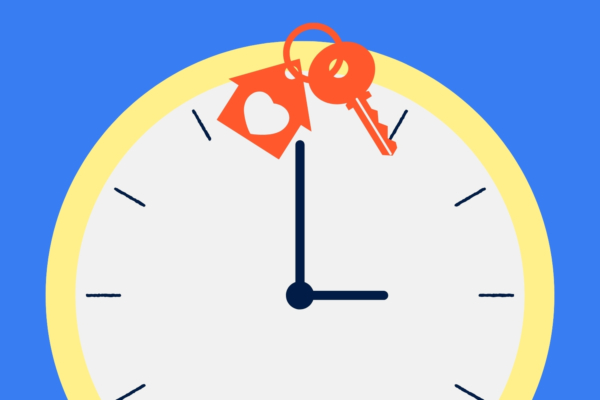
Guide to Homebuying: Practical First-Time Homebuyer Tips

Being in the market for your first home is an exciting time! There are so many benefits to homeownership to look forward to. But because this purchase is so large—maybe the largest you’ll make in your lifetime—there’s a lot of homework, research, calculating, and learning you’ll need to do before you get a new set of keys. How do you research something you’ve never done before? Start here!
11 First-Time Homebuyer Tips
We can’t take the stress out of this complicated process, but we can give you some of the best tips and tricks we’ve seen homebuyers take advantage of. Here are our top eleven tips for first-time homebuyers.
1. Adjust your expectations.
Buying a home involves way more than just a mortgage payment. Along with property taxes and homeowners’ insurance, it’s worthwhile to consider the specific challenges that come with a home. Think about situations like: will you be able to afford to replace an entire air conditioning system if the unit breaks in your new home? Do you have the time to do the minimum upkeep? How much work are you willing to put into a home, and do you know how to do that work? These are all things to think about before you even start looking.
For some folks, renting is a better option overall. People like the flexibility that comes with renting—you can live in multiple locations, you can change your neighborhood fairly quickly, and you also might have more job opportunities if you can move at the drop of the hat. Beyond flexibility, renters don’t have to worry about repairs to their home, taxes, or many of the other added costs related to homeownership. Take the time to think about what you really value in a home—whether it’s owned or rented— to make sure you are in a place to be a homeowner.
Meet our team and get started.
Our local, award-winning lending team is ready to help you begin today.
2. Make a list of deal-breakers and prepare to compromise.
Even if you’re having a custom home built, you have to be prepared to make compromises when it comes to what you are looking for in a house. The reality is that you may not find your dream home in your price range.
Your priorities and preferences are going to be different from other homebuyers. Think about what you like about your current living situation and a possible future home. Which factors are must-haves, which are deal-breakers, and which details can be flexible with? Some homebuyers might be willing to sacrifice an extra bathroom to live in a desired school district, while others might take a longer commute if it means getting a larger house.
From gas stoves to the size of your windows, knowing where your priorities are before you get started can help save you time and stress. Before you start looking, make a list of must-haves that accounts for your family’s needs. And as you continue to look at homes, this list is pretty likely to change, so update it as your needs evolve!
3. Know your credit history.
Ever heard the saying “your reputation precedes you”? This applies to many areas of life— including buying a house. In this case, your credit history and score are your financial reputation.
A credit score is a number between 350-850 that represents your creditworthiness. It’s based on a number of factors including payment history, current debt, length of credit history, and types of credit and is calculated by three major credit bureaus: Equifax, Experian, and TransUnion. A financial institution will use this number to assess the likelihood that you’ll repay any money that you borrow.
Because of that, it’s important that your credit score is in good shape before you set out to buy a home. A poor credit score can prevent you from getting the lowest interest rates on your loan, or worse— it can leave you with a denied loan application altogether.
Confused about where to start with your credit report? Read our article on becoming a credit report expert!
4. Start a timeline.
It can take months or even years to become a homeowner. There are many steps to homeownership, and each step takes time.
Start by creating a rough timeline to give yourself some goals to work with. What your timeline looks like will depend on where you currently are in the process, but it may include milestones like:
- Hitting the savings goal for your down payment
- Finding the best mortgage lender in your area
- Getting prequalified or preapproved (which we will talk more about below)
- Finding a good real estate agent
Be prepared to be patient and flexible while setting your goals. Being too strict with your timeline may result in you purchasing a home that you regret. It’s one of the biggest purchases you’ll ever make! So the time spent preparing is worth it.
5. Think about the future in your home.
Will this be your house for the long term or just for a few years? Before you start your home search, this will be an important question to think about. If you only see yourself staying in the home for a few years, you may want something more turnkey and move-in ready. If you’re hoping that this will be your forever home, you may be willing to put a little more effort into making the house your home. If selling is in your future, you’ll also want to think about resale values and potential market changes.
6. Get prequalified for a mortgage.
Once you are ready to seriously start looking at homes, get prequalified or preapproved for a mortgage. Prequalification is a process that demonstrates that you meet a lender’s minimum requirements. To do this, you’ll provide some basic financial information and the lender will determine whether or not you meet their basic loan qualifications.
Getting prequalified lets sellers know that you’re serious about buying and makes you a more attractive buyer, which is something that is important in a hot seller’s market. You’ll also learn how much the lender will be willing to lend you— a helpful number to know when house hunting.
7. Know your down payment and first-time homebuyer assistance options.
You’ll hear the number “20%” a lot. There’s good reason for it—if you can put 20% down on a home, you’ll immediately have a considerable chunk of equity in your home, benefit from a lower monthly mortgage payment, and avoid paying private mortgage insurance.
But what if you don’t have 20% to put down? Don’t worry! There are mortgage products available that allow for a smaller down payment— sometimes as little as 3%. Additionally, you may qualify for a first-time homebuyer assistance program. Your mortgage lender will help you find a solution that works best for you and your family.
8. Create a budget.
All the steps in the home buying process are important, but your budget might be one of the most critical. What your lender says you can borrow and what you can comfortably afford may be very different numbers.
Additional home costs should always be factored into your budget. Most of these are not costs that renters pay, so it’s even more important you get an idea of what your monthly payment will actually be like. Some of these monthly housing costs, in addition to your mortgage, can include, but are not limited to:
- Property taxes
- Higher utility bills (electricity, water, sewer, trash, etc.)
- Homeowners association (HOA) fees
- Homeowners’ insurance
- Mortgage interest
- Additional insurance (hazard, flood, etc.)
- Consumables and maintenance (air filters, gutter-cleaning, etc.)
Without a good idea of what these other costs look like, you could end up with a home that you can’t really afford. You don’t want to end up in a situation where you are stretched beyond your means.
9. Find a real estate agent that you can trust.
A real estate agent is a valuable resource in every aspect of the homebuying process. Find an agent that you can trust by doing research and getting recommendations. Some real estate agents specialize in certain areas, types of homes, or budgets, so do some research to find the best one for what you’re looking for. Don’t be afraid to ask questions, to make sure they know the area you’re looking in!
10. Get a home inspection before you make a purchase.
Again, your home is a big purchase—so it’s in your best interest to know of any major flaws before you buy one! You don’t want to be surprised with hidden damage after you’ve bought the home.
No property is perfect, and an inspection can’t catch everything—but having as much information as possible before you sign a contract is the best move. Hire a certified home inspector who will cover all areas of the home, including but not limited to structural issues, electrical, HVAC, insulation, roofing, ventilation, and plumbing.
Be sure you know what areas the inspector will (and won’t) cover during the inspection. For example, not all inspectors check for things like rodents, mold, formaldehyde, or termites. You may need to schedule additional services or inspections for those issues.
11. Be prepared to do a little work on your own.
While you can certainly call a professional to fix or troubleshoot issues, be prepared to tackle some home repair projects on your own.
If you don’t have one already, invest in a basic toolbox with items like screwdrivers, a hammer, wrenches, and pliers. You may even want to look into taking a homeowner’s DIY class from a local hardware store to learn how to make basic repairs.
The Bottom Line
Purchasing your first home may seem overwhelming, but the good news is that it’s not something that you’ll do alone. You’ll have plenty of professionals that will help and guide you along the way, like your real estate agent and your lender. Don’t hesitate to reach out to our home lending team at Amplify Credit Union to take the first steps on your home buying journey today.
Ready to get prequalified?
Apply today and start your journey toward your new home.


